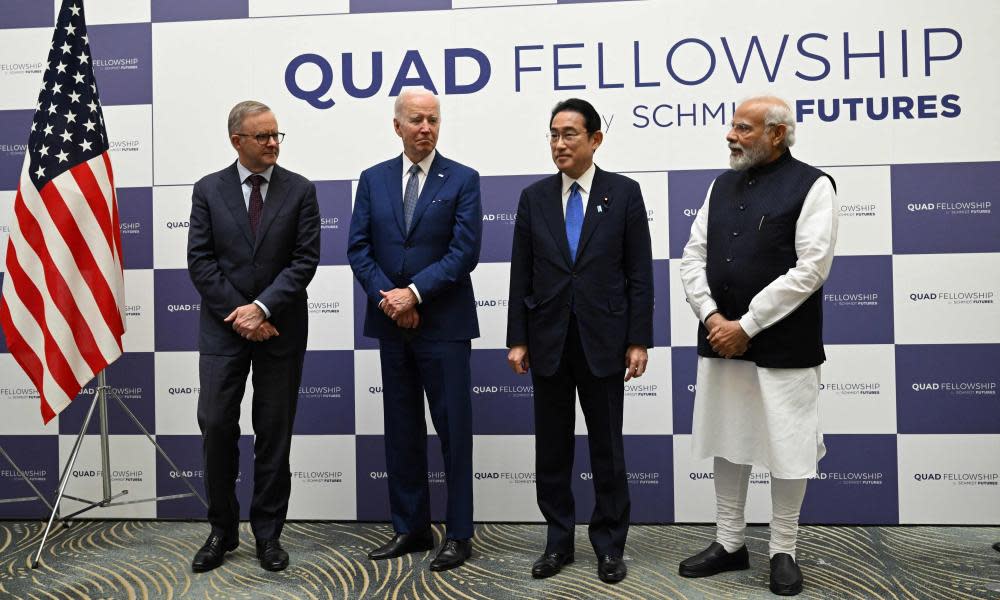Albanese insists ‘we will determine our values’ after Chinese premier reaches out to new PM

The prime minister, Anthony Albanese, says his government will not bend to demands from China to reset the strained relationship despite overtures from Beijing in the wake of Labor’s election win.
Speaking after a meeting of the quadrilateral security dialogue (Quad) in Tokyo on Tuesday, Albanese confirmed the Chinese premier, Li Keqiang, had sent a congratulatory letter to him following Saturday’s election win. The letter was first reported by Chinese state media Xinhua on Monday.
Albanese said he welcomed the message from Li but indicated little had changed in the government’s view of China. He insisted: “It is China that has placed [trade] sanctions on Australia. There is no justification for doing that and that’s why they should be removed.”
The prime minister said that no “serious person” had believed suggestions made by the Coalition in the lead up to the election that a Labor government would adopt a softer approach to Beijing.
Related: Anthony Albanese in Tokyo for tense Quad talks after Joe Biden says US would defend Taiwan
Albanese referenced an infamous list of 14 grievances provided by a Chinese embassy official to the Nine Network in late 2020 as the relationship deteriorated to its lowest point in decades.
“The truth is that Australia is a great democracy – we stand for our values which are consistent,” Albanese said on Tuesday.
“The demands, which were placed by China, are entirely inappropriate, we reject all of them. We will determine our own values, we will determine Australia’s future direction. It’s China that’s changed, not Australia.”
In Li’s message, which marks the end of a two-year freeze on communications between senior members of the two governments, Li called for the “sound and stable” development of China-Australia relations.
“The Chinese side is ready to work with the Australian side to review the past, look into the future and uphold the principle of mutual respect and mutual benefit, so as to promote the sound and steady growth of their comprehensive strategic partnership,” Li said.
Albanese said that Australia “seeks good relations with all countries” when asked if it was up to him to repair relations with China – in part to help Western Australia’s resources sector.
The prime minister would not be drawn on remarks made by the US president, Joe Biden, about the potential for military action to defend Taiwan, saying there was no change in Australia’s position to support strategic ambiguity on the issue.
“Well, our position is there should be no unilateral change to the status quo. Our position has not changed,” Albanese said.
His firm stance on China came after a meeting with the leaders of the US, Japan and India, whom Albanese praised as Australia’s “like-minded friends”. He used the meeting to commit Australia to bring fresh energy and resources to the goal of ensuring a secure and prosperous Indo-Pacific.
Albanese said the meeting had discussed how the four countries could engage more in the Indo-Pacific and “push our shared values in the region at a time when China was clearly seeking to exert more influence”.
Related: Australia to stand with Pacific islands on climate crisis and ‘respect’ region, Penny Wong says
The Labor leader stressed that Australia’s commitment to the Quad had not changed and “will not change” under his leadership.
“The new Australian government’s priorities align with the Quad agenda – taking action on climate change, and building a stronger and more resilient Indo-Pacific region, through better economic security, better cybersecurity, better energy security and better environmental and health security,” Albanese said.
“We will stand firm on our values and our beliefs, on what we know will enhance the prosperity and stability of our region and what is firmly in the interests of all those who call the Indo-Pacific home.”
He said that Australia wanted to pursue positive and practical ways to support a “free, open and resilient Indo-Pacific”, and that he believed climate change was the main economic and security challenge for the island countries of the Pacific.
“Under my government, Australia will set a new target to reduce emissions by 43% by 2030, putting us on track for net zero by 2050,” Albanese said.
“We will bring more energy and resources to securing our region as we enter a new and more complex phase in the Pacific’s strategic environment. And we will continue to stand with you, our like-minded friends, and collectively we will continue to stand up for each other.
Related: Russia’s invasion of Ukraine underlines need for ‘free and open’ Indo-Pacific, Biden says
The US president spoke more assertively about the security threat in the region, saying the world was facing a “transformative moment” where the challenge ahead was a contest between democracies and autocracies.
“That is what this is about – democracies v autocracies – and we have to make sure we deliver,” Biden said.
Ahead of the meeting, Biden had indicated that the US would be prepared to intervene militarily to defend Taiwan if necessary, remarks which departed from the US’s longstanding position of strategic ambiguity.
Biden also spoke at length about the war in Ukraine, saying Russia’s aggression in Europe was a “dark hour in our shared history”, and highlighted the challenge facing the Quad to maintain regional security in the Indo-Pacific region.
“The Russian brutal and unprovoked war against Ukraine has triggered a humanitarian catastrophe; innocent civilians have been killed on the streets and millions of refugees are internally displaced as well as exiled,” Biden said.
“This is more than just a European issue. This is a global issue.”


